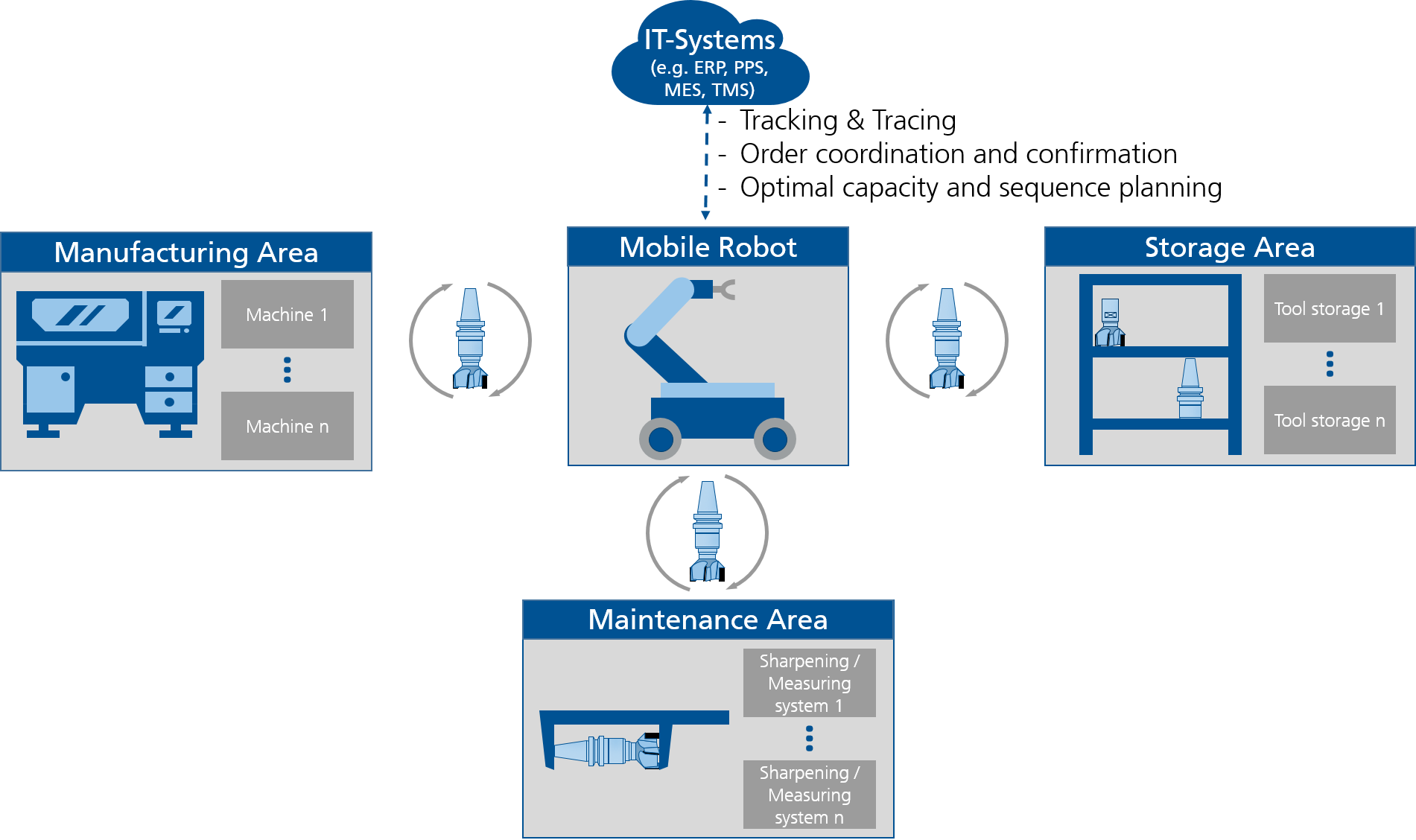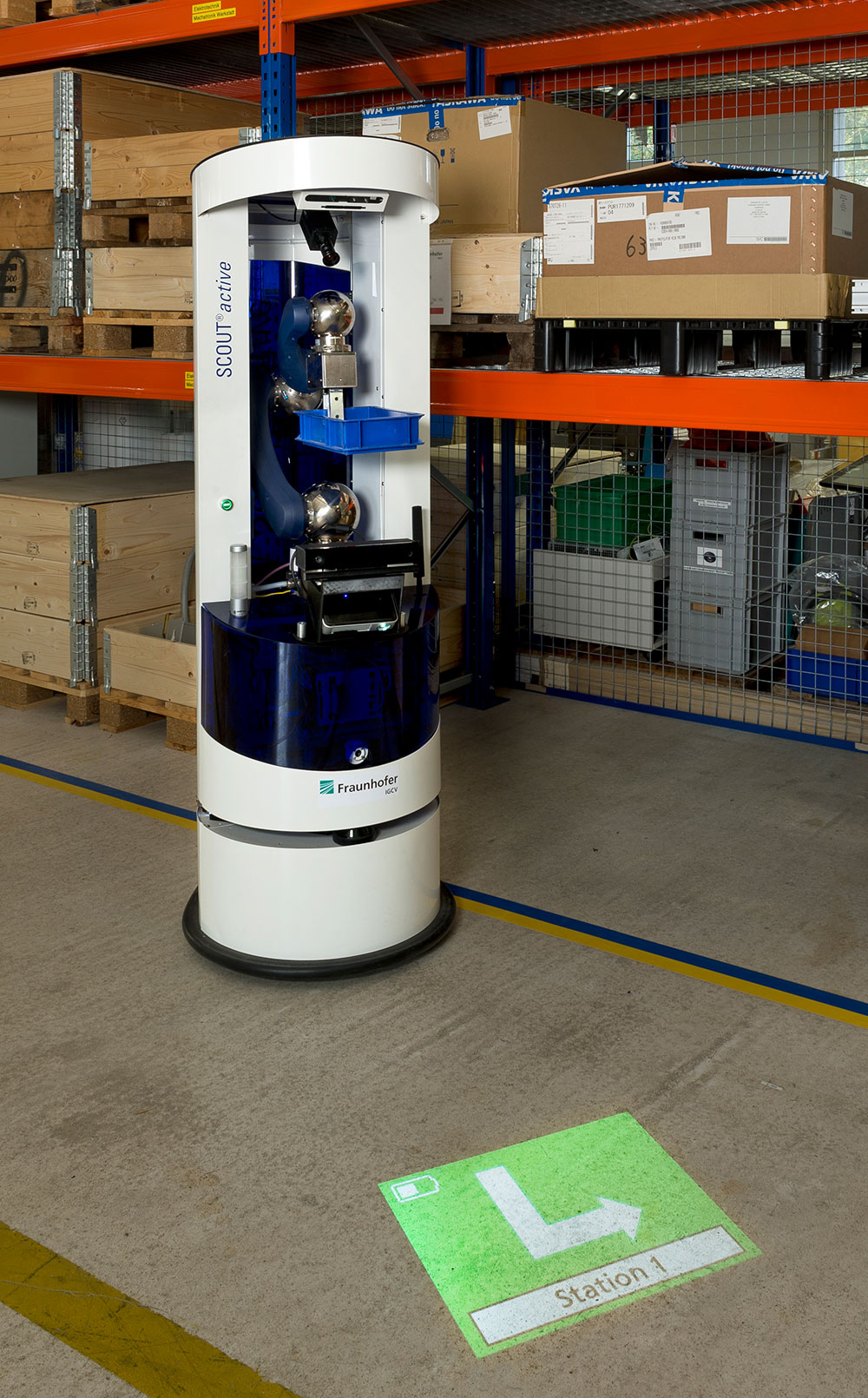Due to the increased product variance in manufacturing companies as a result of the advancing individualization of customer requirements, the number of necessary tool changes is increasing. The supply processes for the required tools are usually carried out manually and often cause downtimes due to a lack of supply. By automating the tool supply by means of mobile assistance robotics, the "AutoWerk" project aims to find solutions to avoid production interruptions and thus increase the economic efficiency of production.
AutoWerk | Automated, networked, robust tool logistics using assistance robotics
Initial situation and problem definition
As a subfield of tool management, tool logistics deals with the tool flow and the tool-related information flow within production companies. A core task of tool logistics is the timely supply of production machines with the required tools. The processes for tool supply comprise on the one hand the transport of tools between storage and maintenance areas and the manufacturing system and on the other hand the assembly and disassembly of tools and clamping devices. In industrial practice, these processes are currently carried out mainly manually. Especially for small and medium-sized enterprises (SME) in the manufacturing industry, tool supply is a considerable challenge. Due to often small quantities with a large number of product variants, a large number of tools must be provided to machines on schedule and set-up procedures must be initiated. In order to minimize plant downtimes, the set-up processes and tool logistics must be efficient and robust. However, the large proportion of manual activities in tool supply means that, depending on the production system, plant operators have to spend up to 25 % of their working time on tool provision. These times are mainly spent on searches and travel times between tool storage and the place of use. As a result, about 15 % of running production orders are interrupted due to missing tools.
Concept of the "AutoWerk" research project

Objective
The aim of the "AutoWerk" research project is to increase the performance and reliability of tool logistics by developing a holistic automation concept and to carry out an evaluation from an economic point of view. The concept includes the execution of the transport processes by means of mobile assistance robots, which are to ensure the punctual provision of required tools at the machines by means of intelligent routing strategies. By means of an integrated manipulator and developed end effectors, the assistance robots are able to carry out handling processes to pick up and deliver the transported tools. The selection of the required gripper is automated depending on the current task and the type of tool. This enables the mobile robots to perform simple quality control and assembly tasks during the transport process, such as inserting a tool into a clamping device. A central control system is provided to control the robots. This takes over order coordination and confirmation as well as monitoring of the assistance robots and capacity and sequence planning. For this purpose, the control system must be able to communicate not only with the robots but also with manufacturing systems and the IT systems involved, such as ERP or PPS. At the same time, the interaction between humans and robots should be made possible intuitively and without specific knowledge. In this way, the support provided by mobile assistance robotics relieves the burden on plant personnel and enables them to focus on value-adding activities.
Procedure
The first step is to define relevant and industry-oriented use cases for the use of mobile assistance robots in tool logistics in cooperation with the partners involved. On this basis, the processes, material and information flows of the application scenarios are first recorded in detail, analyzed and transferred to a requirements catalogue. Using a simulation model, the automation potential of the application scenarios will be evaluated and the use cases prioritized. In the next project phase, a holistic concept for the automation of tool logistics will be developed. On the one hand this includes the conception of the described control system including the algorithms for routing and the implementation of priority rules for orders. On the other hand, physical interfaces between robot, machine and storage systems are developed and solutions for cooperation between humans and robots are designed. Having finalized the concept, the following elements are implemented: the software modules and the hardware components already being adjusted to production and assembly needs. In doing so the planned system components are realized. They are assembled to form a functional overall system at the Fraunhofer Institute for Casting, Composite and Processing Technology IGCV, which is tested and optimized by means of a demonstrator. Finally a technical and an economic evaluation of the concept for the automation of tool logistics will be carried out.
Project accompanying committee
- Gaugler & Lutz OHG
- Grenzebach Maschinenbau GmbH
- ME Industries GmbH
- GS1 Germany GmbH
- HEFTER Maschinenbau GmbH & Co. KG
- SALT Solutions AG
- software4production GmbH
Further information
The IGF project 20266 N of the Forschungsvereinigung Bundesvereinigung Logistik (BVL) e.V. is funded via the AiF within the framework of the program for the promotion of joint industrial research and development (IGF) by the Federal Ministry of Economics and Energy on the basis of a resolution of the German Bundestag.
The research project is being carried out in close cooperation between the Fraunhofer Institute for Casting, Composite and Processing Technology IGCV and the Chair for Materials Handling, Material Flow and Logistics (fml) at the Technical University of Munich (TUM).
